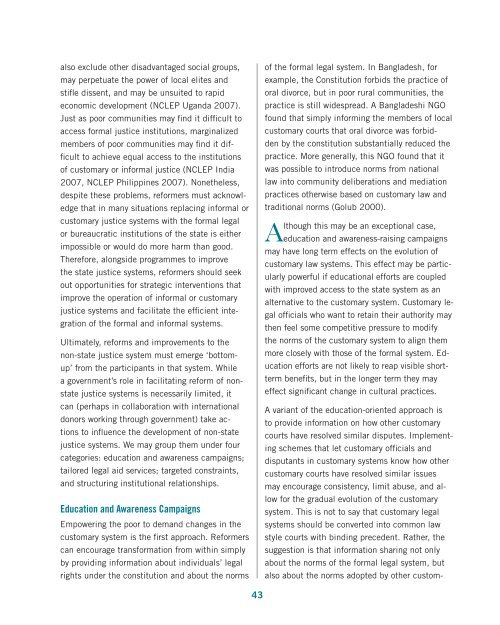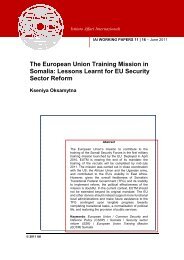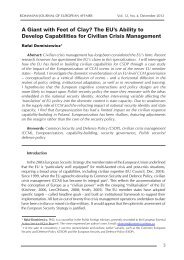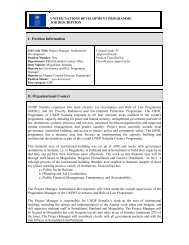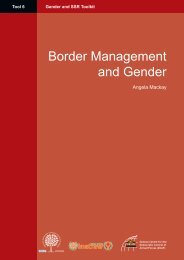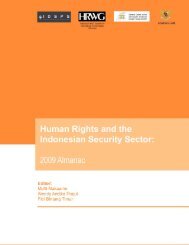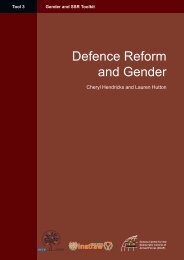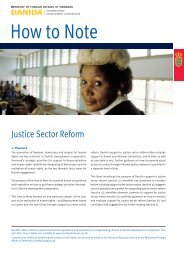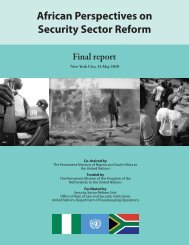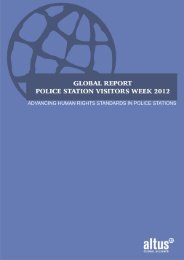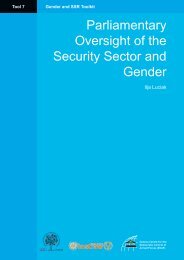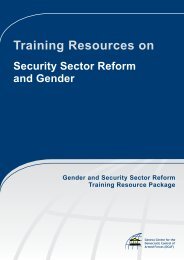Making The Law Work for Everyone Commission on Legal ... - ISSAT
Making The Law Work for Everyone Commission on Legal ... - ISSAT
Making The Law Work for Everyone Commission on Legal ... - ISSAT
Create successful ePaper yourself
Turn your PDF publications into a flip-book with our unique Google optimized e-Paper software.
also exclude other disadvantaged social groups,may perpetuate the power of local elites andstifle dissent, and may be unsuited to rapidec<strong>on</strong>omic development (NCLEP Uganda 2007).Just as poor communities may find it difficult toaccess <str<strong>on</strong>g>for</str<strong>on</strong>g>mal justice instituti<strong>on</strong>s, marginalizedmembers of poor communities may find it difficultto achieve equal access to the instituti<strong>on</strong>sof customary or in<str<strong>on</strong>g>for</str<strong>on</strong>g>mal justice (NCLEP India2007, NCLEP Philippines 2007). N<strong>on</strong>etheless,despite these problems, re<str<strong>on</strong>g>for</str<strong>on</strong>g>mers must acknowledgethat in many situati<strong>on</strong>s replacing in<str<strong>on</strong>g>for</str<strong>on</strong>g>mal orcustomary justice systems with the <str<strong>on</strong>g>for</str<strong>on</strong>g>mal legalor bureaucratic instituti<strong>on</strong>s of the state is eitherimpossible or would do more harm than good.<str<strong>on</strong>g>The</str<strong>on</strong>g>re<str<strong>on</strong>g>for</str<strong>on</strong>g>e, al<strong>on</strong>gside programmes to improvethe state justice systems, re<str<strong>on</strong>g>for</str<strong>on</strong>g>mers should seekout opportunities <str<strong>on</strong>g>for</str<strong>on</strong>g> strategic interventi<strong>on</strong>s thatimprove the operati<strong>on</strong> of in<str<strong>on</strong>g>for</str<strong>on</strong>g>mal or customaryjustice systems and facilitate the efficient integrati<strong>on</strong>of the <str<strong>on</strong>g>for</str<strong>on</strong>g>mal and in<str<strong>on</strong>g>for</str<strong>on</strong>g>mal systems.Ultimately, re<str<strong>on</strong>g>for</str<strong>on</strong>g>ms and improvements to then<strong>on</strong>-state justice system must emerge ‘bottomup’from the participants in that system. Whilea government’s role in facilitating re<str<strong>on</strong>g>for</str<strong>on</strong>g>m of n<strong>on</strong>statejustice systems is necessarily limited, itcan (perhaps in collaborati<strong>on</strong> with internati<strong>on</strong>ald<strong>on</strong>ors working through government) take acti<strong>on</strong>sto influence the development of n<strong>on</strong>-statejustice systems. We may group them under fourcategories: educati<strong>on</strong> and awareness campaigns;tailored legal aid services; targeted c<strong>on</strong>straints,and structuring instituti<strong>on</strong>al relati<strong>on</strong>ships.Educati<strong>on</strong> and Awareness CampaignsEmpowering the poor to demand changes in thecustomary system is the first approach. Re<str<strong>on</strong>g>for</str<strong>on</strong>g>merscan encourage trans<str<strong>on</strong>g>for</str<strong>on</strong>g>mati<strong>on</strong> from within simplyby providing in<str<strong>on</strong>g>for</str<strong>on</strong>g>mati<strong>on</strong> about individuals’ legalrights under the c<strong>on</strong>stituti<strong>on</strong> and about the normsof the <str<strong>on</strong>g>for</str<strong>on</strong>g>mal legal system. In Bangladesh, <str<strong>on</strong>g>for</str<strong>on</strong>g>example, the C<strong>on</strong>stituti<strong>on</strong> <str<strong>on</strong>g>for</str<strong>on</strong>g>bids the practice o<str<strong>on</strong>g>for</str<strong>on</strong>g>al divorce, but in poor rural communities, thepractice is still widespread. A Bangladeshi NGOfound that simply in<str<strong>on</strong>g>for</str<strong>on</strong>g>ming the members of localcustomary courts that oral divorce was <str<strong>on</strong>g>for</str<strong>on</strong>g>biddenby the c<strong>on</strong>stituti<strong>on</strong> substantially reduced thepractice. More generally, this NGO found that itwas possible to introduce norms from nati<strong>on</strong>allaw into community deliberati<strong>on</strong>s and mediati<strong>on</strong>practices otherwise based <strong>on</strong> customary law andtraditi<strong>on</strong>al norms (Golub 2000).Although this may be an excepti<strong>on</strong>al case,educati<strong>on</strong> and awareness-raising campaignsmay have l<strong>on</strong>g term effects <strong>on</strong> the evoluti<strong>on</strong> ofcustomary law systems. This effect may be particularlypowerful if educati<strong>on</strong>al ef<str<strong>on</strong>g>for</str<strong>on</strong>g>ts are coupledwith improved access to the state system as analternative to the customary system. Customary legalofficials who want to retain their authority maythen feel some competitive pressure to modifythe norms of the customary system to align themmore closely with those of the <str<strong>on</strong>g>for</str<strong>on</strong>g>mal system. Educati<strong>on</strong>ef<str<strong>on</strong>g>for</str<strong>on</strong>g>ts are not likely to reap visible shorttermbenefits, but in the l<strong>on</strong>ger term they mayeffect significant change in cultural practices.A variant of the educati<strong>on</strong>-oriented approach isto provide in<str<strong>on</strong>g>for</str<strong>on</strong>g>mati<strong>on</strong> <strong>on</strong> how other customarycourts have resolved similar disputes. Implementingschemes that let customary officials anddisputants in customary systems know how othercustomary courts have resolved similar issuesmay encourage c<strong>on</strong>sistency, limit abuse, and allow<str<strong>on</strong>g>for</str<strong>on</strong>g> the gradual evoluti<strong>on</strong> of the customarysystem. This is not to say that customary legalsystems should be c<strong>on</strong>verted into comm<strong>on</strong> lawstyle courts with binding precedent. Rather, thesuggesti<strong>on</strong> is that in<str<strong>on</strong>g>for</str<strong>on</strong>g>mati<strong>on</strong> sharing not <strong>on</strong>lyabout the norms of the <str<strong>on</strong>g>for</str<strong>on</strong>g>mal legal system, butalso about the norms adopted by other custom-43


